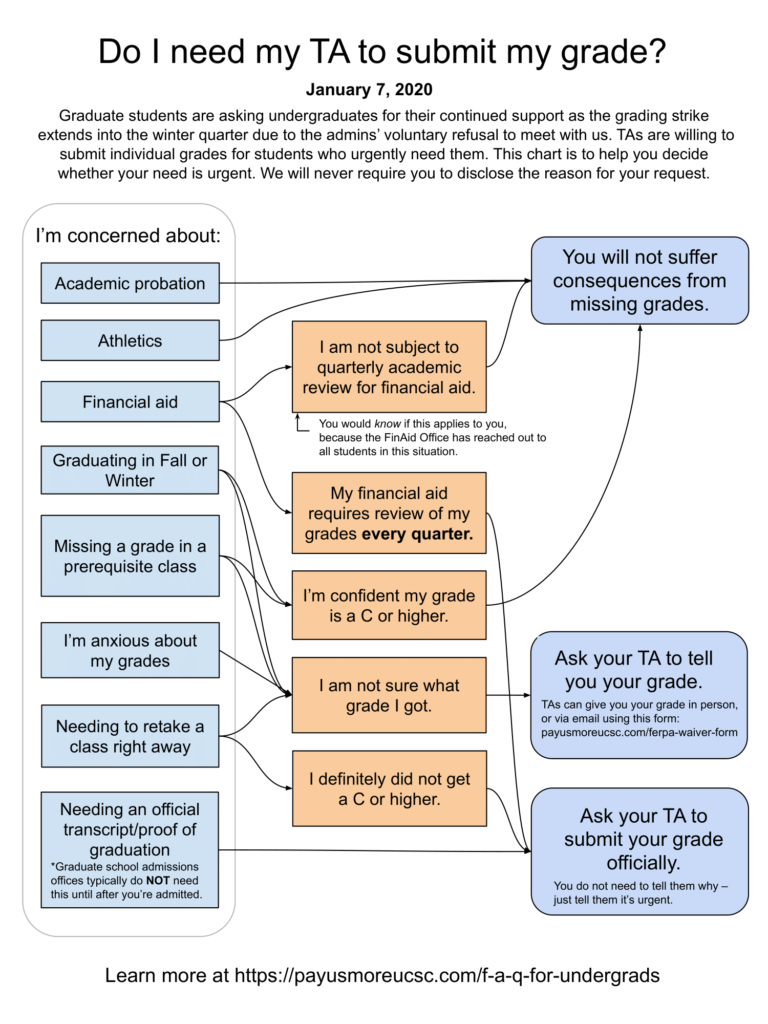To UCSC Administration,
We first register our dismay that your latest deadline to turn in grades (details attached) arrived to us with less than 24 hours to respond. Some fired graduate workers have not received the offer and many will simply miss the email as they adjust to the uncertainty of the pandemic.
The Santa Cruz wildcat strikers have always been open and responsive to good faith communications, initiating multiple requests to negotiate, including a “grade trade” offer back in February—all refused by administration. Instead of negotiating with us collectively and in good faith, the administration’s approach aims to instill panic in individual grade withholders in a renewed attempt to undermine collective action. The COLA movement, however, will continue to make decisions collectively.
In that vein, we are unable to respond to this deadline without clarifications on the following points:
- Will fired graduate student workers who are now not able to find a spring appointment receive compensation?
- Will GSIs who have had their class removed receive compensation?
- Will those graduates who were made ineligible for spring appointments (rather than fired from an existing spring appointment) receive compensation if they are unable to find a new appointment?
With affirmative clarification on the above points, the COLA movement will agree to collectively submit grades under the following terms:
- The removal of all disciplinary measures from student records for past actions related to the wildcat strike, including the grading strike, the picket line, campus shutdowns, the ARC office takeover, and dining hall takeovers, and the guarantee not to further pursue student conduct procedures against students who were involved in these actions.
- A guarantee of full reinstatement for the spring quarter for all fired graduate student workers, including TAs and GSIs and those graduate students made ineligible for spring appointments, along with full compensation for those who cannot find an appointment at this late time.
- A guarantee of eligibility for future ASE appointments for all fired graduate student workers.
- That the administration remove clause E: “In the event XXXXX is terminated from employment pursuant to this Agreement, XXXXX waives her right to a Skelly hearing. XXXXX and the Union acknowledges and agree that the parties waive their right to file a grievance or complaint with the University of California, the courts or any governmental administrative agency concerning her dismissal for failure to adhere to the terms and conditions of this Agreement.”
- A guarantee that this offer be expanded to students who are withholding Winter quarter grades.
- An expansion of the $2,500 housing supplement to all graduate students including MA students, MFA students beyond the 2nd year of their program, PhD students beyond the 5th year of their program, and all fired graduate students.
- A written commitment to advocate for UCOP to immediately engage in good faith bargaining with UAW 2865 over a Cost of Living Adjustment (COLA) for all ASEs in the UC system. We are not striking to be reinstated; we are striking for a COLA.
The context of the global COVID-19 pandemic has only intensified the urgent need to make fired workers whole. The University of California cannot remain content with a wishful vision of “online business as usual” while its imperiled workers struggle to adapt to drastic changes in their working and living conditions. Now more than ever, graduate student workers, including those of us who are immunocompromised or otherwise particularly vulnerable to COVID-19, need job security, a living wage, and freedom from unjust and arbitrary discipline.
We are open to negotiation, as we have expressed and pushed for throughout this strike. We ask that you renege your bad faith offer and meet our good faith one. We expect clarifications and an answer to our terms by the end of the week, Friday 11:59pm.
Signed,
UC Santa Cruz Wildcat Strikers
ATTACHMENT TO BOTTOM OF EMAIL: Word Doc of “Last Chance Agreement”
______________________
Kavitha’s email:
Hi everyone,
I wanted to send you an update on your Notices of Actions to Dismiss and the emails you received telling you that you would not be eligible for ASE employment in the future.
As many of you have likely heard, management has agreed to offer jobs for the spring quarter and in quarters thereafter to all of you, should you decide to submit grades by 5pm today or if you have already submitted the rest of your fall quarter grades. Attached is a template for such an agreement, though it would be tailored to your specific case.
If that timeline is too short and you need another day, please be in touch. Like nearly any agreement for reinstatement for these types of activities, the agreement for you would likely include, like the one attached, a limit on future wildcat grade withholding.
I hope you’re all safe amidst the ever-changing conditions of COVID-19.
Sincerely,
Kavitha
Text of the Last Chance Agreement
Last Chance Agreement Between
XXXX
And
University of California, Santa Cruz
And
UAW 2865
March 29, 2020
The University of California Santa Cruz (hereinafter referred to as the University), XXXX (hereinafter referred to as XXXX and the United Auto Workers 2865 (hereinafter referred to as Union) enter into this Last Chance Agreement (hereinafter referred to as Agreement).
Acknowledgements
On March 26, 2020, XXXX received a letter notifying her that she would be dismissed from her spring teaching assistant appointment in XXXXX effective March 31, 2020 for failing to turn in fall quarter grades after a directive from interim Campus Provost and Executive Vice Chancellor Lori Kletzer.
On or about March 27, 2020, the University received information from XXXX regarding her submission of fall quarter grades. XXXXX submitted documentation, including two letters of support from her fall and winter quarter instructors of record, as well as a personal letter discussing that she remains committed to taking actions in the best interest of her students now and in the future.
On March 28, 2020, the University confirmed that XXXXXX submitted her fall and winter quarter grades.
In light of XXXXX subsequent grade submission and commitment to her students, the University agrees that it will not seek to dismiss XXXXX with the Union’s agreement to the following:
Terms and Conditions
- Upon signature of this Agreement, the Notice of Dismiss dated March 26, 2020 and all supporting documents including but not limited to the Notice of Intent to Dismiss and Skelly recommendation, will be withdrawn. None of the listed documents will be placed in XXXXX personnel file. Without a dismissal on file, XXXXX will retain her spring quarter 2020 teaching assistant position in XXXXX.
- XXXXX is required to meet the standards of performance required of an academic student employee position, including but not limited to adherence to the description of duties form, compliance with Regental policy 1111, and timely and accurate submission of grades for all quarters in which she holds an academic student employee appointment from the date of signature on this Agreement through the date XXXXX graduates from her degree program or separates from the University, whichever is earlier. Her failure to meet these standards will subject her to automatic dismissal and loss of future eligibility for an academic student employee appointment with the University from the effective date of this Agreement.
- Nothing in this Agreement precludes XXXXX from engaging in protected, concerted activity.
- XXXXX acknowledges and agrees that her continued employment with the University is contingent upon her compliance with the terms and conditions of this Agreement, and that her failure to comply with all terms and conditions of the Agreement subjects her to dismissal upon execution of this Agreement.
- In the event XXXXX is terminated from employment pursuant to this Agreement, XXXXX waives her right to a Skelly hearing XXXXX and the Union acknowledges and agree that the parties waive their right to file a grievance or complaint with the University of California, the courts or any governmental administrative agency concerning her dismissal for failure to adhere to the terms and conditions of this Agreement.
- The parties further agree that this Agreement shall not serve as a precedent for the resolution of any other issue or grievance and that this Agreement shall not be precedent setting.
- Nothing contained herein shall be deemed an admission by the University of any misfeasance or liability whatsoever.
- It is further agreed that XXXXX and the Union will not grieve this Agreement.
- If any provision, or portion of any provision(s), of this Agreement is found to be invalid or unenforceable, such provision or portion thereof shall be deemed severed and the remaining terms of the Agreement shall remain in effect.
This Last Chance Agreement incorporates the entire understanding between the parties and recites the sole consideration for the promises exchanged herein. In reaching this agreement, neither party has relied on any presentation or promise except as expressly set forth herein. Each of the undersigned parties hereby acknowledges that a representative of their own choosing has represented them and that they understand and fully aware of the contents and legal effect of this Last Chance Agreement and agree to be bound by the terms contained herein.
///
///
Date: Date:
For the University: XXXXX
____________________________ ____________________________
Jennifer Schiffner,
Director, Employee & Labor Relations
For UAW 2865:
____________________________
Kavitha Iyengar, President


